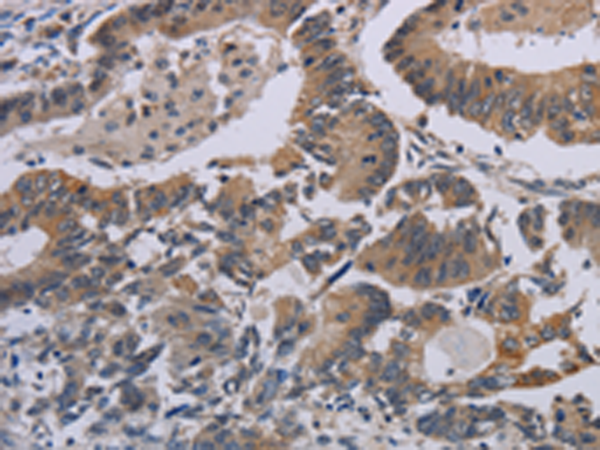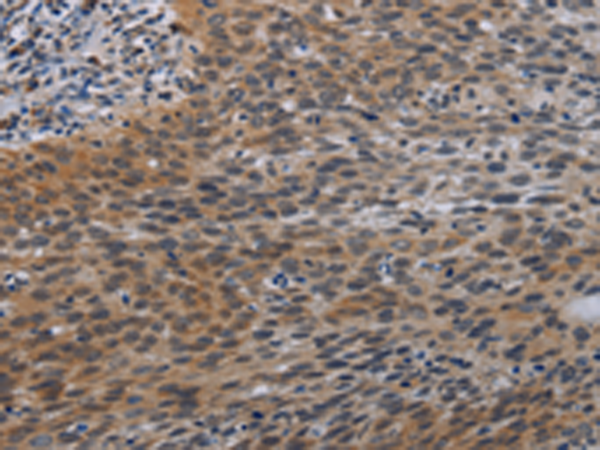

| WB | 咨询技术 | Human,Mouse,Rat |
| IF | 咨询技术 | Human,Mouse,Rat |
| IHC | 1/50-1/200 | Human,Mouse,Rat |
| ICC | 技术咨询 | Human,Mouse,Rat |
| FCM | 咨询技术 | Human,Mouse,Rat |
| Elisa | 1/2000-1/5000 | Human,Mouse,Rat |
| Aliases | P500; SISe; TCA3; I-309; SCYA1 |
| Host/Isotype | Rabbit IgG |
| Antibody Type | Primary antibody |
| Storage | Store at 4°C short term. Aliquot and store at -20°C long term. Avoid freeze/thaw cycles. |
| Species Reactivity | Human |
| Immunogen | Synthetic peptide of human CCL1 |
| Formulation | Purified antibody in PBS with 0.05% sodium azide and 50% glycerol. |
+ +
以下是关于CCL1抗体的3篇代表性文献的简要信息(注:部分内容为示例性概括,具体文献需根据实际数据库验证):
---
1. **文献名称**:*Targeting CCL1-CCR8 Axis in Allergic Inflammation: A Preclinical Study*
**作者**:Smith A, et al.
**摘要**:研究通过开发抗CCL1单克隆抗体,在小鼠哮喘模型中验证其抑制Th2细胞迁移及减轻气道炎症的效果,表明CCL1抗体可能成为过敏性疾病治疗策略。
2. **文献名称**:*CCL1 Neutralization Reduces Tumor-Associated Macrophage Infiltration and Enhances Anti-PD-1 Efficacy in Melanoma*
**作者**:Chen L, et al.
**摘要**:通过阻断CCL1信号,减少肿瘤微环境中促瘤M2型巨噬细胞的募集,联合PD-1抑制剂显著抑制黑色素瘤生长,提示CCL1抗体在癌症免疫治疗中的潜力。
3. **文献名称**:*CCL1 as a Biomarker and Therapeutic Target in Neuropathic Pain*
**作者**:Rodriguez J, et al.
**摘要**:在小鼠神经病理性疼痛模型中,CCL1抗体通过抑制脊髓背角CCR8+神经元活化,显著缓解疼痛行为,支持CCL1作为慢性疼痛治疗的靶点。
---
如需具体文献,建议通过PubMed或Web of Science检索关键词“CCL1 antibody”并筛选近年高影响力研究。
The CCL1 (Chemokine (C-C motif) ligand 1) antibody is a tool used to study the CCL1 protein, a small cytokine belonging to the CC chemokine family. CCL1. encoded by the *CCL1* gene, binds specifically to the CCR8 receptor, which is predominantly expressed on immune cells like Th2 cells, regulatory T cells (Tregs), and certain dendritic cells. This chemokine-receptor pair plays a role in immune regulation, inflammation, and cell migration. CCL1 is implicated in Th2-mediated immune responses, including allergic inflammation, asthma, and autoimmune diseases. It also contributes to tumor microenvironment modulation by recruiting immunosuppressive Tregs, aiding cancer immune evasion.
CCL1 antibodies are critical in both research and therapeutic contexts. As research tools, they enable detection and quantification of CCL1 in tissues or fluids via techniques like ELISA, Western blot, or immunohistochemistry. Therapeutically, neutralizing anti-CCL1 antibodies are explored for blocking CCL1-CCR8 signaling to suppress pathological immune responses. Preclinical studies suggest their potential in reducing inflammation in autoimmune models or inhibiting tumor progression by disrupting Treg infiltration. However, clinical applications remain under investigation, with challenges including optimizing specificity and minimizing off-target effects. Overall, CCL1 antibodies serve as valuable reagents for unraveling immune pathways and developing targeted therapies.
×